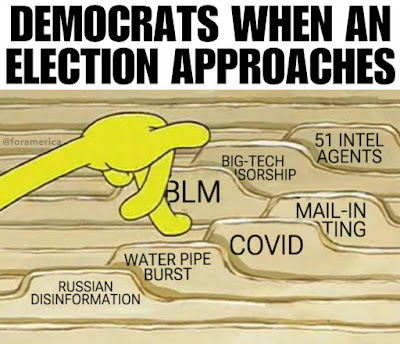Mail in voting has gained attention, particularly during the COVID-19 pandemic when concerns about in-person gatherings and the potential spread of the virus led many to explore alternative voting options.
Here's how the concepts of mail-in voting and lockdowns are related?
COVID-19 Lockdowns and Health Concerns: The COVID-19 pandemic prompted many governments and health authorities around the world to implement lockdowns, stay-at-home orders, and social distancing measures to prevent the spread of the virus. In this context, traditional in-person voting methods posed challenges due to the potential for large gatherings and close interactions at polling places, which could contribute to the spread of the virus. This led to increased interest in expanding access to mail-in ballots as a way to mitigate health risks while still allowing people to participate in elections.
Expanded Use of Mail-In Ballots: In response to the pandemic, some jurisdictions expanded access to mail-in ballots or absentee voting to provide voters with safer alternatives to in-person voting. This involved sending registered voters their ballots by mail, which they could then fill out and return through postal services or designated drop-off locations. These measures aimed to maintain the democratic process while minimizing health risks during the pandemic.
Debate and Controversy: The expanded use of mail-in ballots led to debates and controversies in some regions. Some argued that mail-in voting could be susceptible to fraud or irregularities, while others believed it was a necessary response to the unique circumstances of the pandemic. The increased reliance on mail-in ballots also raised questions about the capacity of postal services to handle the influx of ballots and deliver them in a timely manner.
Legislative Changes and Adaptations: In many cases, governments had to adapt existing election laws and regulations to accommodate the expanded use of mail-in ballots. This included setting up mechanisms for requesting, processing, and verifying these ballots, as well as establishing clear deadlines for their submission. Some jurisdictions also made changes to election processes to ensure transparency and security in mail-in voting.
Varied Approaches: The response to mail-in ballots during COVID-19 lockdowns varied significantly from one jurisdiction to another. Some places embraced mail-in voting as a primary method, while others maintained a stronger focus on in-person voting while offering expanded options for mail-in ballots.
How did COVID lockdowns affect the last election of 2020?
The 2020 United States presidential election was held against the backdrop of the COVID-19 pandemic, and the lockdowns and health concerns associated with the pandemic had a significant impact on various aspects of the election process. Here are some ways in which COVID lockdowns affected the election:
Increased Interest in Mail-In Voting: Due to the pandemic and concerns about in-person voting, there was a heightened interest in mail-in voting or absentee voting. Many states expanded access to mail-in ballots to provide voters with a safer alternative to casting their votes in person. This expansion of mail-in voting was intended to reduce the risk of virus transmission during the election.
Challenges to In-Person Voting: Lockdowns and social distancing measures created challenges for in-person voting. Some polling places faced difficulty in finding suitable locations that could accommodate physical distancing requirements. Additionally, there were concerns about the health and safety of both voters and poll workers in densely populated areas.
Changes in Voting Procedures: Many states adjusted their voting procedures to accommodate the circumstances. Some states extended early voting periods to reduce crowds on Election Day, while others expanded opportunities for early and absentee voting. These changes aimed to provide voters with more flexibility and reduce the congestion at polling places.
Election Worker Shortages: Some jurisdictions experienced shortages of election workers due to health concerns. Typically, polling places are staffed by volunteers, many of whom are older individuals more vulnerable to the severe effects of COVID-19. The pandemic led to a shortage of these volunteers in some areas, potentially affecting the smooth operation of polling places.
Legal and Political Controversies: The expansion of mail-in voting led to legal and political controversies. Some states faced legal challenges regarding changes to voting procedures, including the expansion of mail-in voting. There were debates about the security and integrity of mail-in ballots, with some alleging the potential for fraud, although widespread evidence of significant fraud was not substantiated.
Counting and Reporting Delays: The increase in mail-in ballots, which take longer to process than in-person votes, led to delays in vote counting and reporting of election results. Some states were unable to finalize their results on election night due to the large volume of mail-in ballots that needed to be processed and verified.
Media Coverage and Voter Behavior: Media coverage of the pandemic and its impact on the election played a role in shaping voter behavior. Concerns about health and safety influenced some voters' decisions on whether to vote in person or use mail-in options.
It's worth noting that the impact of COVID lockdowns on the 2020 election was complex and multifaceted. Different states and localities implemented various measures based on their own circumstances and public health guidelines. The overall effect was a unique election characterized by a mix of in-person and mail-in voting, with challenges and controversies brought about by the pandemic.












